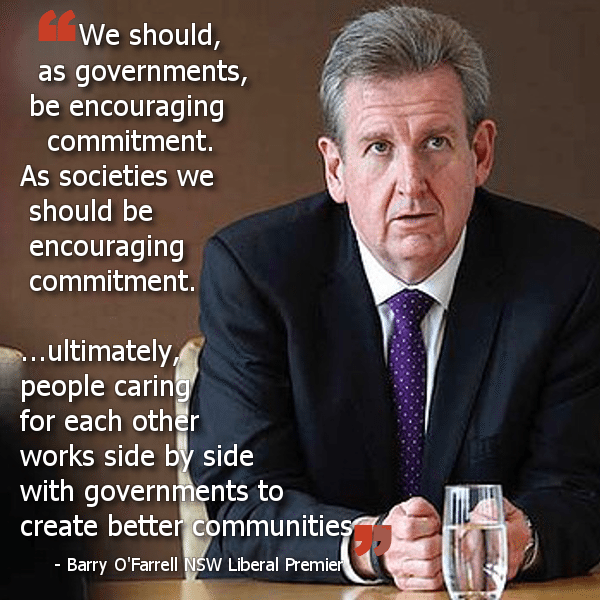
Barry O’Farrell has declared his strong support for legalising same-sex marriage in Australia and challenged the federal Opposition Leader, Tony Abbott, to allow a conscience vote on the issue.
In the first public comments confirming his support a day after the New Zealand parliament voted to change its national laws, the Premier said same-sex marriage was ”about family”.
While his preference was for the Federal Parliament to change the Marriage Act, if a parliamentary inquiry in NSW found the state could act alone, he would vote for legislation that might be introduced.
”My view – a view that I’ve come to in recent years – is that as a Liberal who believes that commitment and family units are one of the best ways in which society is organised, I support the concept of same-sex marriage,” Mr O’Farrell said. ”We should, as governments, be encouraging commitment. As societies we should be encouraging commitment. Because, ultimately, people caring for each other works side by side with governments to create better communities.”
At the federal level, Prime Minister Julia Gillard does not favour change but has allowed Labor MPs a conscience vote. But Mr Abbott, who is also opposed, has ruled out a conscience vote for Liberal MPs, a decision viewed as contributing to the failure of same-sex marriage bills last year. Asked about Mr Abbott’s position, Mr O’Farrell said Federal Parliament ”ought to reflect the community and allow same-sex marriage. I think in coming to that decision the Federal Parliament should do so by way of a conscience vote across all parties.”
A NSW upper house inquiry is considering whether the state is constitutionally able to legalise same-sex marriage.
In November, a cross-party working group of MPs from the Coalition, Labor and the Greens and an independent gave notice it would introduce the State Marriage Equality Bill in the upper house.
Last May the upper house voted 22 to 16 in favour of a motion supporting same-sex equality but many believe legislation to legalise same-sex marriage would be defeated in the lower house.
An upper house Greens MP and member of the cross-party working group, Cate Faehrmann, said Mr O’Farrell’s advocacy could change that. ”In relation to the lower house, I don’t think you can underestimate what leadership from the Premier means,” she said.
Mr O’Farrell said he was ”not going to campaign on the issue” but felt the NZ vote presented a ”suitable opportunity” to express his view.
The Premier said he did not believe in using his position in the party room to sway votes on matters of conscience and there was ”sufficient distance” between his comments and a possible vote in the parliament for that not to happen. Mr O’Farrell said his views were not those he held five or six years ago. ”It’s been an evolving thought process with me.”
Hearing the NZ Parliament break into a Maori love song after the vote ”even tweaked at my emotions. You just get a concept of how deeply people feel about this”.
Mr O’Farrell said the argument that same-sex marriage would denigrate the institution of marriage was ”utterly ridiculous”.
Anne Twomey, an associate professor with the law school at the University of Sydney, said NSW had the power to legalise same-sex marriage but raised the possibility that state laws would conflict with the federal Marriage Act.
She said a significant potential problem would be how state law connected with Commonwealth laws such as those dealing with de facto relationships, which dictated property rights if a couple broke up. ”It’s just very, very difficult. I would be very reluctant to do this.”
Ms Twomey said she could understand why pushing for NSW laws was attractive as ”a political lever” to spur the Commonwealth to action. ”But given you’re mucking around with people’s lives, you have to be absolutely confident that you have a system that’s going to work and is not going to leave people in complete chaos in their relationships later on,” she said.
Author: Sean Nicholls
Publication: SMH
Publication Date: April 18 2013
